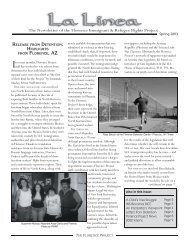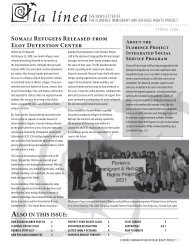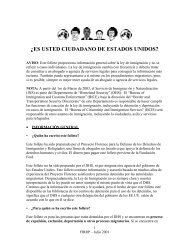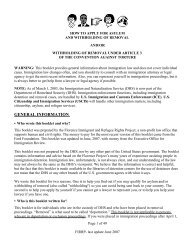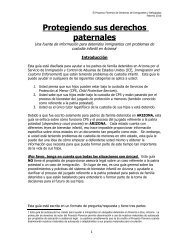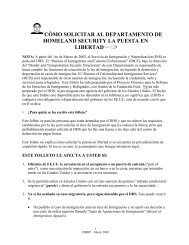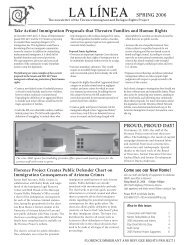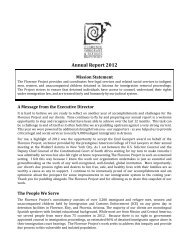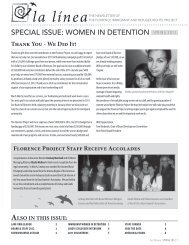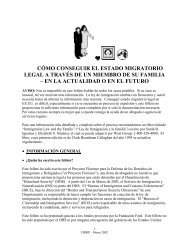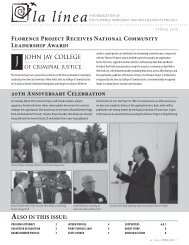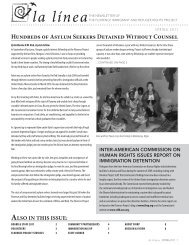quick reference chart and annotations for determining immigration ...
quick reference chart and annotations for determining immigration ...
quick reference chart and annotations for determining immigration ...
You also want an ePaper? Increase the reach of your titles
YUMPU automatically turns print PDFs into web optimized ePapers that Google loves.
Immigrant Legal Resource Center, Florence Immigrant <strong>and</strong> Refugee Rights Project,<br />
Maricopa County Public Defender August 2012<br />
1. Attempt, A.R.S. § 13-1001.<br />
Summary: Generally, a conviction <strong>for</strong> attempt carries the same <strong>immigration</strong> consequences as the<br />
principal offense. Matter of Vo, 25 I&N Dec. 426, 428 (BIA 2011) (“An attempt involves the specific<br />
intent to commit the substantive crime, <strong>and</strong> if commission of the substantive crime involves moral<br />
turpitude, then so does the attempt, because moral turpitude inheres in the intent”); United States v.<br />
Taylor, 529 F.3d 1232, 1238 (9th Cir. 2008) (Arizona's definition of “attempt” is coextensive with the<br />
federal definition); United States v. Gomez-Hern<strong>and</strong>ez, 680 F.3d 1171, 1175 (9th Cir. 2012) (same).<br />
There are two instances where conviction of attempt potentially brings an <strong>immigration</strong> advantage,<br />
however. See discussion of the effect of its lesser potential sentence (at CMT) <strong>and</strong> the domestic violence<br />
ground of deportability (at Otherwise Removable). Note that a plea to attempt will undermine the<br />
<strong>immigration</strong> benefit of a plea to assault by recklessness under §§ 13-1203 or 13-1204. While reckless<br />
assault has been held not to be a crime of violence, <strong>immigration</strong> courts will not recognize “attempted<br />
reckless” assault.<br />
Crime Involving Moral Turpitude (CMT): Attempt to commit a CMT will be held to be a<br />
CMT. However, the fact that an attempt conviction carries a smaller maximum sentence than the<br />
principal offense may avoid <strong>immigration</strong> consequences based on a single CMT. The same is true <strong>for</strong><br />
conviction of solicitation <strong>and</strong> facilitation. A single CMT conviction may not have <strong>immigration</strong><br />
consequences if the potential sentence is sufficiently low <strong>and</strong> the person has no prior CMTs.<br />
• A single CMT conviction causes deportability under the CMT ground only if the offense was<br />
committed within five years after admission <strong>and</strong> carries a potential sentence of a year or more. 8<br />
USC § 1227(a)(2)(A)(i). Thus a potential sentence of under a year prevents deportability <strong>for</strong> a<br />
single CMT.<br />
• A single CMT conviction will not cause inadmissibility if it carries a potential sentence of a year<br />
or less, with an actual sentence imposed of six months or less. 8 USC § 1182(a)(2)(A)(ii). Thus<br />
a potential sentence of a year or less can prevent inadmissibility <strong>for</strong> a single CMT.<br />
See further discussion at “Note: Crimes Involving Moral Turpitude.” The authors conservatively<br />
assume that <strong>immigration</strong> authorities will hold a class 6 felony to have a potential sentence of more than a<br />
year due to Guidelines, so the goal is to get to a misdemeanor. A conviction <strong>for</strong> attempt will cause a class<br />
6 felony to become a class 1 misdemeanor. A conviction <strong>for</strong> solicitation will cause a class 5 or 6 felony<br />
to become a class 1 or 2 misdemeanor. A conviction <strong>for</strong> facilitation will cause a class 4 or 5 felony to<br />
become a class 1 misdemeanor, <strong>and</strong> a class 6 felony to become a class 3 misdemeanor. (However, post-<br />
Blakely <strong>immigration</strong> counsel can argue that where no aggravating factors are present, a class 6 felony<br />
carries a presumptive sentence of one year, low enough to qualify <strong>for</strong> the petty offense exception – so that<br />
is worth obtaining if it is the best available.)<br />
Aggravated Felony: An attempt to commit an aggravated felony is an aggravated felony under 8<br />
USC § 1101(a)(43)(U). United States v. Taylor, 529 F.3d 1232, 1238 (9th Cir. 2008) (Arizona's<br />
definition of “attempt” is coextensive with the federal definition).<br />
Otherwise Removable: As discussed in the Summary above, a conviction <strong>for</strong> attempt generally<br />
carries the same <strong>immigration</strong> consequences as the principal offense. However, some deportation grounds<br />
do not include attempt to commit the offense at all; there, a plea to attempt provides <strong>immigration</strong> counsel<br />
with an argument. Because part of the domestic violence deportation ground does not specifically include<br />
Arizona Criminal Chart with Explanatory Endnote – August 2012<br />
11



